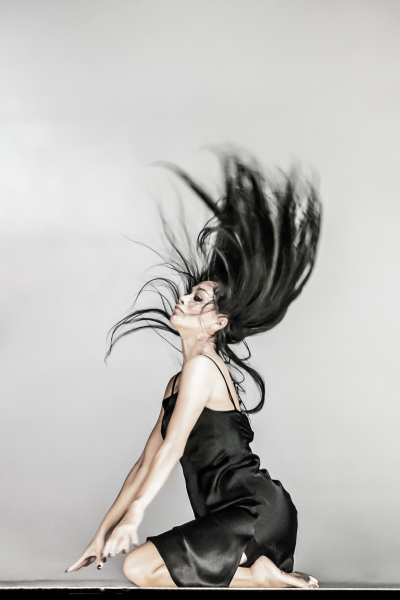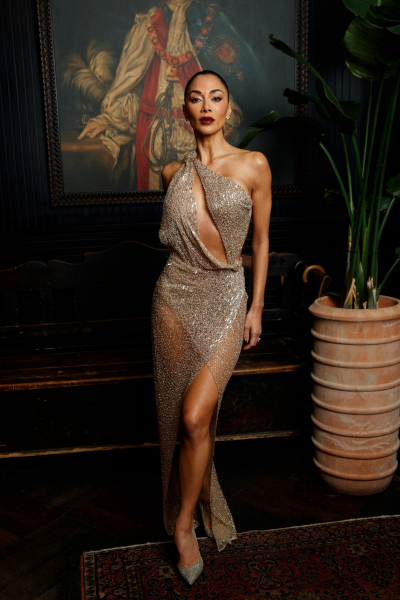
It is a Friday night at the Savoy Theatre in London’s West End and Nicole Scherzinger – barefoot, wearing nothing but a simple black slip dress and minimal make-up, the tips of her ironed, raven hair tickling her waist – is performing to a sell-out house. She is not here as a Pussycat Doll, or a solo artist, or in any capacity as a talent show judge, but as Norma Desmond: the ageing, eccentric, washed-up silent film actress looking for a way back into the spotlight, and the protagonist of director Jamie Lloyd’s utterly electric new version of Andrew Lloyd Webber’s 1993 musical, Sunset Boulevard. “It’s not a comeback,” she drawls, plumes of dry ice dissipating behind her, “it’s a return.”
It certainly is. Simply put, as the opening sentence of one five-star rave gushes, Scherzinger “absolutely bloody smashes it” as Desmond. Though when Lloyd first came to his star with the proposition that she take on the role, the singer was, she says – with no hint of humour when we meet prior to the show – “Offended. I was insulted.”
You can, perhaps, imagine why. After all, Norma Desmond (first made famous by the turban-wearing Gloria Swanson in Billy Wilder’s 1950 darkly comic noir on which the musical is based, and later on stage by Patti LuPone and Glenn Close), is a character synonymous with failure and humiliation and desperation – as well as high camp. (For those who have never seen the film nor play: think 1940s Hollywood Miss Havisham.) In her silent era heyday Norma Desmond, was – as one musical number has it – the Greatest Star of All. But with the arrival of talkies she is “thrown away”, says Scherzinger, “she’s discarded”. When her path crosses with that of a young screenwriter (superbly played by Tom Francis, surely a star in the making), the opportunity to reclaim her life suddenly seems within reach.
“This chick is crazy, she’s pathetic, I ain’t playing her,” was Scherzinger’s response to Lloyd (whose previous hits include the recent The Effect, Betrayal and Evita). “Even I had that preconceived notion of like, you know, the turrrban and the draaaama,” she continues, throwing her hands up and head back. “I think the character is supposed to be in her fifties, so I’m thinking I could play that in ten years. With this Asian skin,” she deadpans, “I could play it in 20 years.”
It is a couple of weeks earlier and Scherzinger, 45, and I are tucked away in a tiny nook in the Savoy Theatre. Even in this dimly lit corner, with the whiff of old cigarette smoke and spilled drink still embedded in the walls and carpet, she is pure Hollywood: baseball cap pulled low over her eyes, sunglasses next to a bottle of Smart Water on the table, a Vetements puffer jacket drawn over leggings and a vest. She is hunched over her phone when I arrive and in the moment or two it takes for her to look up and acknowledge me, it’s hard not to detect a flash of the diva-ish Desmond. But it quickly dissolves once she starts talking about what drew her back to the stage and the part she has described as the “role of her life”.
“I read the script and started to really connect with her on many levels,” she says of coming round to the idea. She knows, for example, “what it’s like having abandonment issues; dealing with the torment of change; [the] desperation of needing affirmation from others.” So too, does she “know what it’s like to feel dismissed” by a fickle entertainment industry and public. At the height of The Pussycat Dolls’ popularity in the Noughties, the band, of which Scherzinger was easily the most famous, were one of the most successful girl groups in the world, selling upwards of 55 million albums. But after their split, Scherzinger failed to reach the solo success it was presumed she’d achieve.

“I know what it’s like [to be considered] not as ‘relevant’ or out of ‘fashion’,” she says, drawing exaggerated quotation marks in the air. “When you’re like, I’m still just as talented if not more, because I have so much more experience and courage to say what I want to say. I have so much more to give. But time goes by. And the new generation comes or a new sound comes or a new whatever comes and… I feel very blessed that I’ve been able to stay working. But I would have loved to have had my music be more well received.”
Scherzinger doesn’t shy away from pointing out the parallels between her and her character, and nor does the production. Like Swanson before her, Scherzinger is happy to send herself up to both humorous and moving effect. There are, for example, knowing references to her previous chart-topping success as a younger woman, and she more than leans into the campier side of the part. If she’s wholly serious in person (when I ask whether she’s enjoying her time in London, she replies “not yet”), on stage she is surprisingly funny. But so too are there moments of haunting vulnerability.
The fact that Scherzinger’s primary fear about taking the role was judgement – “They’re gonna think I’m some old hag,” was what she told Lloyd – shows just how depressingly prevalent the themes of the 1940s-set play still are. In fact, when her part was announced, Scherzinger received criticism for being too young and attractive to play Desmond (though I’m not sure LuPone or Close did when they also took on the role in their mid-forties back in the ’90s. Go figure). If things have marginally improved for women in film and music, ageism is still rife. “I remember when I hit my thirties and they’re like, you can’t be on the radio,” she says. “I’m like, what about John Legend? What about all these other artists? It’s brutal.”
But she is, frankly, past caring about any of that. With each decade that passes, “it gets better”, she says. “I’m definitely the most courageous I’ve ever been in my life with the music that I’m writing, not giving a shit what anyone else thinks, or doing it for them,” she says. Nowadays, “it’s not so much just seeking that validation, or wanting to be popular. It’s more about wanting to truly leave something behind.” She points at my notebook, motioning for me to write “an encouraging word for people: hang on, it gets better”. She briefly chuckles. “You got to do the work though,” she adds solemnly, “or the demons will catch up with you.”
Is she in therapy? “So much damn therapy,” she says, sounding almost irritated at the thought of it. “I have a psychologist,” she begins, “a psychiatrist, a life coach, a pastor,” she pauses, mentally running through a list in her head. “A priest. I have everything.”
It sounds as if this show might offer some catharsis she has been chasing. “You know,” she says, “I’m fully vulnerable on this show. I become an ugly, ugly mess up there. I was always so insecure, and I’m still very insecure, but I didn’t think I’d ever want to show people that side of me.” And now? “And now I’m like, fuck it.” Her voice hardens. “I’m going to give you everything. You’re gonna get all of me. I got nothing to lose.”



